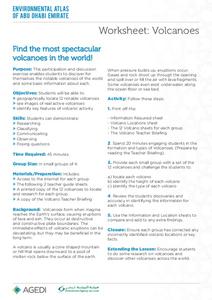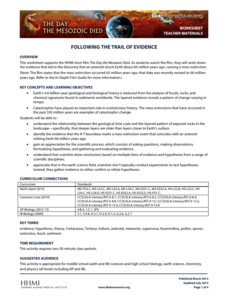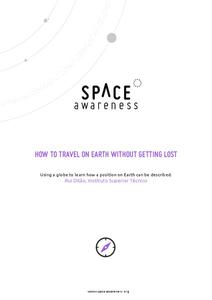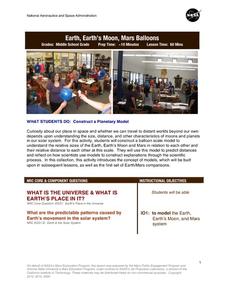Environment Agency - Abu Dhabi
Find the Most Spectacular Volcanoes in the World!
Heat things up in your earth science class with this collaborative lesson plan on volcanoes. After first being introduced to the different types of volcanoes and how they are formed, young geologists work in small groups to research the...
Purdue University
Sun Tracking System for a Solar Panel
Capture the Sun's rays as best as possible. An engaging STEM lesson teaches scholars about how Earth's tilt causes the path of the sun to change throughout the year. They create solar panel systems that move both horizontally and...
Howard Hughes Medical Institute
Following the Trail of Evidence
One important skill in analyzing scientific evidence is identifying facts versus opinions. Scholars identify pieces of evidence from the film The Day the Mesozoic Died and then discuss this evidence in small groups at the end of each act...
Film Foundation
The Day The Earth Stood Still: Film Language And Elements Of Style
In this, the third in a series of four resources that use Robert Wise's 1951 version of The Day The Earth Stood Still as the core text, young film makers examine the language of film including shot composition, camera angle, lighting,...
Curated OER
The Volcano Factory
Collaborative groups work together to report on the volcanic activity leading to island formation and construct models to demonstrate the process. Consider having each group present their project to the rest of the class. There are many...
NASA
Rain Gauge Activity
Complete teacher narrative and presentation slides for teaching about Earth's water make up the bulk of this lesson. Embedded within the slide show, you will find videos about the water cycle, keeping track of the limited supply of fresh...
Curated OER
Mapping the Aegean Seafloor
Earth science learners create a two-dimensional topographic map of the floor of the Aegean Sea. They use it to then create a three-dimensional model of the ocean floor features. This comprehensive resource delivers strong background...
Curated OER
Fossil Fuels (Part I), The Geology of Oil
Junior geologists work through three mini-lessons that familiarize them with the formation and location of fossil fuels. Part one involves reading about petroleum and where it comes from via a thorough set of handouts. A lab activity...
Curated OER
Unit 1: Water is Life: The Heart and Science Behind this Phrase
Water, water, everywhere — but will there be enough to drink? Check out these detailed lesson plans to meet NGSS water cycle and CCSS literacy standards in your science classroom. Learners do a close reading of a challenging, poetic text...
Core Knowledge Foundation
Rocks & Minerals
Take young geologists on an exploration of the rock cycle with this six-lesson earth science unit on rocks and minerals. Through a series of discussions, demonstrations, and hands-on investigations your class will learn about the...
Curated OER
Where Did They Come From?
Give science learners nine questions about the biogeography of hydrothermal vents and turn them loose to research this fascinating habitat. Working in cooperative groups, they prepare a report that addresses each of the questions. A...
Space Awareness
How To Travel On Earth Without Getting Lost
Have you ever wanted to travel the world? Take a virtual trip with a geography lesson that uses longitude and latitude, the position of the sun, an astronomy app, and a classroom globe.
Polar Trec
Where is the World's Water?
Scholars discover the amount of the Earth's water in various locations such as the ocean, ice, the atmosphere, etc. They then make a model of the how much water those percentages represent. Finally, analysis questions bring the concepts...
National Earth Science Teachers Association
The Earth Scientist Project
Pairs of learners choose an earth scientist from an extensive list. They collect information by researching online or in books about the childhood, education, and major contributions made by their chosen scientist. When they present...
National Wildlife Federation
The Water Cycle
Observe the water cycle from the comfort of your classroom with this excellent earth science experiment. Working collaboratively, young scientists first create terrariums complete with hills, plants, lakes, and an atmosphere,...
NASA
Earth, Earth’s Moon, Mars Balloons
Very specific diameters are given for blowing up three different balloons to represent, in scale, the moon, Earth, and Mars. In groups of three, amateur astronomers explore scale measurements and distance in space.
University of California
Seasons Lab Book
Unlock the mystery behind seasonal change with a collection of worksheets and activities. Whether they are drawing pictures of Earth's orbit around the sun or graphing the temperature and daylight hours of different locations from around...
S2tem Centers SC
Seasons
Winter, spring, summer, and fall—take the learning of the seasons beyond the elementary level to the middle school classroom. Curious learners begin by watching videos about the seasons and the rotation of planet Earth. Then, they...
It's About Time
Orbits and Effects
What does your world revolve around? Challenge the class as they learn about orbits and the effects of them on our modern world. Young astronomers begin by measuring ellipses and calculating the eccentricity of Earth's orbit. Then, they...
World Wildlife Fund
Land of the Midnight Sun
From days of 24 hour sunlight, to endless nights that last for days, the Arctic is a very unique place to live. Examine the seasonal changes that occur in the northern-most reaches of the globe and the impact they have on the plants and...
Curated OER
Plate Tectonics: Fifth Grade Lesson Plans and Activities
Fifth graders continue their investigation of the plate tectonics cycle with an exploration of the movement of Earth's crust. During the lab, young geologists conduct an experiment to discover the result of different types of stress...
Curated OER
“THE LORAX” by Dr. Seuss
Few children's books convey the message of conservation as well as Dr. Seuss' The Lorax. Read the story aloud, emphasizing the interconnectedness of plants and animals in an ecosystem and discussing different ways people can help the...
It's About Time
The History and Scale of the Solar System
Take scientists beyond our earthly reach and into the solar system. Pupils create a model of the solar system and discuss strengths and weaknesses of their model. They calculate distances in light years, discuss the nebular theory, and...
Curated OER
Scale Activities
How do you put something as large as the universe in perspective? Use a series of scale experiments. Classmates collaborate around four experiments to examine the scale of the earth-moon system, our solar system, the Milky Way galaxy,...
Other popular searches
- Earth Science Moon Phases
- Branches of Earth Science
- Earth Science Minerals
- Earth Science Inquiry
- Earth Science Lesson
- Earth Science Lesson Plans
- Basic Earth Science
- And Earth Science
- Earth Science Map Reading
- Earth Science and Art
- Earth Science Vocabulary
- Science Earth Layers

























